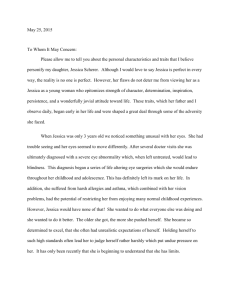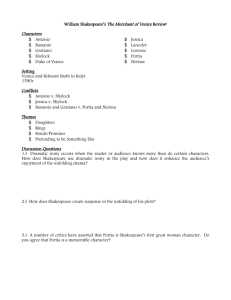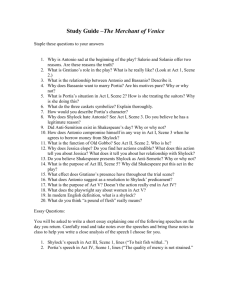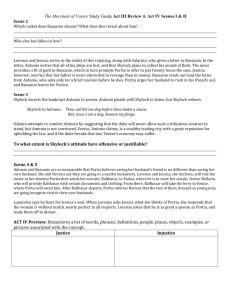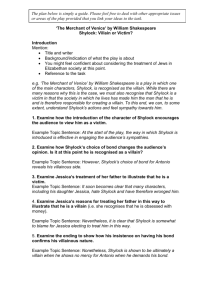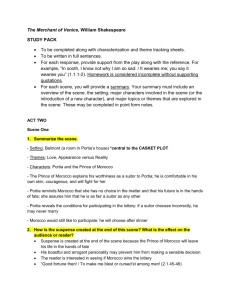Merchant of Venice" Portia and Jessica
advertisement
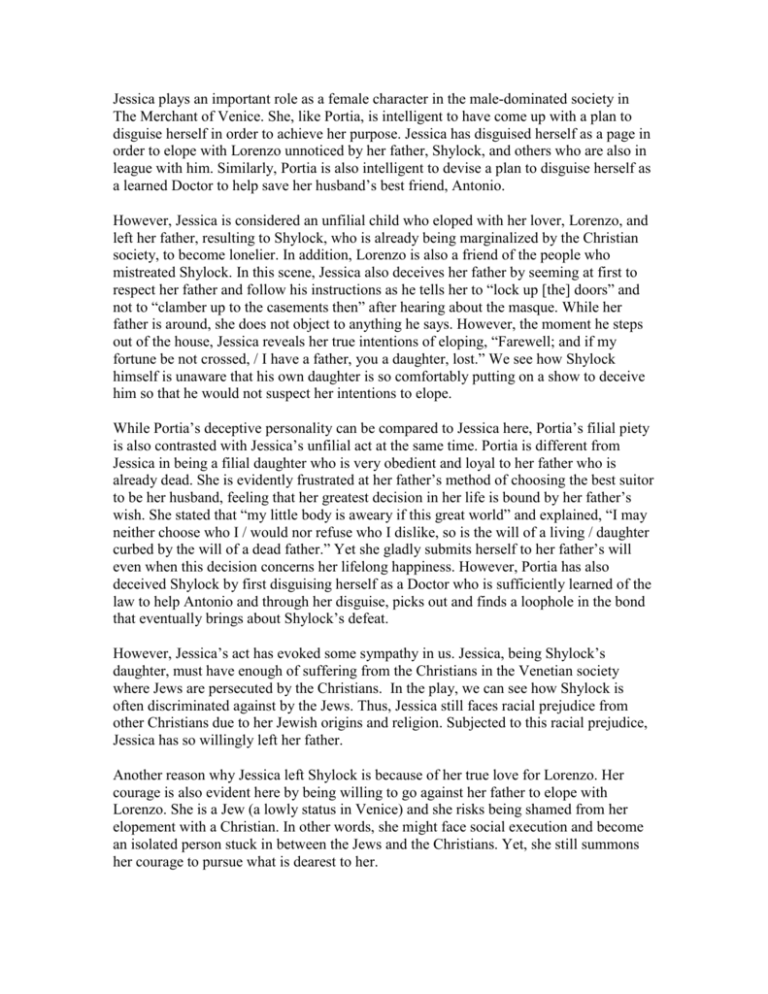
Jessica plays an important role as a female character in the male-dominated society in The Merchant of Venice. She, like Portia, is intelligent to have come up with a plan to disguise herself in order to achieve her purpose. Jessica has disguised herself as a page in order to elope with Lorenzo unnoticed by her father, Shylock, and others who are also in league with him. Similarly, Portia is also intelligent to devise a plan to disguise herself as a learned Doctor to help save her husband’s best friend, Antonio. However, Jessica is considered an unfilial child who eloped with her lover, Lorenzo, and left her father, resulting to Shylock, who is already being marginalized by the Christian society, to become lonelier. In addition, Lorenzo is also a friend of the people who mistreated Shylock. In this scene, Jessica also deceives her father by seeming at first to respect her father and follow his instructions as he tells her to “lock up [the] doors” and not to “clamber up to the casements then” after hearing about the masque. While her father is around, she does not object to anything he says. However, the moment he steps out of the house, Jessica reveals her true intentions of eloping, “Farewell; and if my fortune be not crossed, / I have a father, you a daughter, lost.” We see how Shylock himself is unaware that his own daughter is so comfortably putting on a show to deceive him so that he would not suspect her intentions to elope. While Portia’s deceptive personality can be compared to Jessica here, Portia’s filial piety is also contrasted with Jessica’s unfilial act at the same time. Portia is different from Jessica in being a filial daughter who is very obedient and loyal to her father who is already dead. She is evidently frustrated at her father’s method of choosing the best suitor to be her husband, feeling that her greatest decision in her life is bound by her father’s wish. She stated that “my little body is aweary if this great world” and explained, “I may neither choose who I / would nor refuse who I dislike, so is the will of a living / daughter curbed by the will of a dead father.” Yet she gladly submits herself to her father’s will even when this decision concerns her lifelong happiness. However, Portia has also deceived Shylock by first disguising herself as a Doctor who is sufficiently learned of the law to help Antonio and through her disguise, picks out and finds a loophole in the bond that eventually brings about Shylock’s defeat. However, Jessica’s act has evoked some sympathy in us. Jessica, being Shylock’s daughter, must have enough of suffering from the Christians in the Venetian society where Jews are persecuted by the Christians. In the play, we can see how Shylock is often discriminated against by the Jews. Thus, Jessica still faces racial prejudice from other Christians due to her Jewish origins and religion. Subjected to this racial prejudice, Jessica has so willingly left her father. Another reason why Jessica left Shylock is because of her true love for Lorenzo. Her courage is also evident here by being willing to go against her father to elope with Lorenzo. She is a Jew (a lowly status in Venice) and she risks being shamed from her elopement with a Christian. In other words, she might face social execution and become an isolated person stuck in between the Jews and the Christians. Yet, she still summons her courage to pursue what is dearest to her. Similarly, Portia risked blowing her cover when she disguised herself as a lawyer to help save her husband’s closest friend, Antonio. She also faces social execution if discovered to be breaking the law, a serious offence, but she did it out of her love for her husband. Thus, we can conclude that Jessica and Portia are similar in many aspects and are the leading female characters that are manipulative to a certain extent in this male-dominated society.

